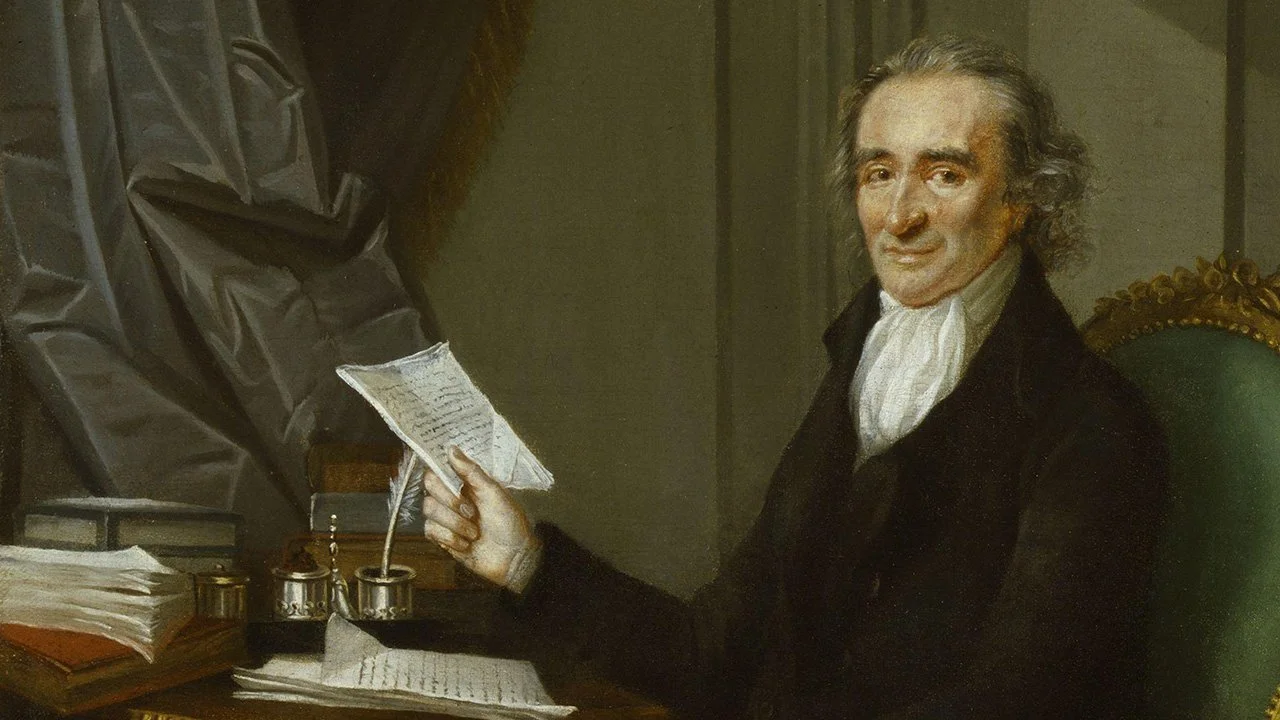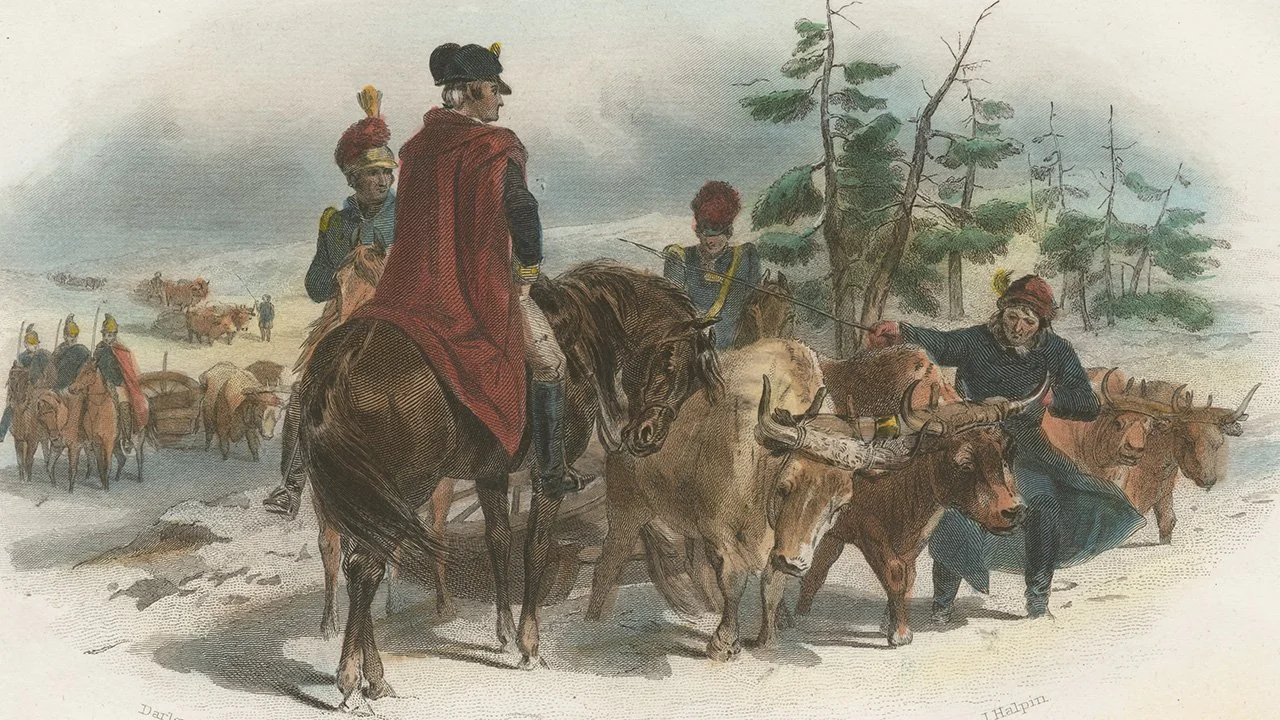John Adams, A Diplomat in Europe
John Adams retired from Congress in November 1777 but was soon appointed as a commissioner to France, marking the start of his diplomatic career. After two years in France, Adams, on his own initiative, set off for Amsterdam, the capital of the Netherlands, to secure recognition of American independence and obtain a desperately needed loan for the United States.
Thomas Paine’s Common Sense Inspires a Nation
To fully appreciate the novelty of Thomas Paine’s Common Sense, one must consider that all colonists had ever known was a dependency on England and a government run by the King. Now this 47-page pamphlet challenged them to consider separating from that powerful nation and replacing the King with something called a democracy.
Thomas Paine, An American Revolutionary
The two most influential books of the Revolutionary era were written by Thomas Paine, an immigrant from England. Common Sense and The American Crisis shaped the American mindset like nothing else.
John Adams Dominates Second Continental Congress
Through sheer force of will and a supremely convincing explanation of democratic government, John Adams almost single-handedly convinced the Second Continental Congress to unanimously approve our Declaration of Independence on July 4, 1776.
The Second Continental Congress Convenes
In 1775, despite the seemingly unavoidable conflict between the colonies and England, there was disagreement regarding our future relationship. Some, like John Dickinson, wanted to remain loyal to the King, some were undecided, and others, including John Adams, wanted to declare independence. Watch Americana Corner’s latest video and learn how the opening debates resulted in a last attempt at reconciliation, and why it still matters today.
John Adams Joins the Fight for Independence
By 1773, John Adams had established a prosperous legal practice and had a fine family. He believed differences with the Crown could be and should be worked out. But after the Boston Tea Party, and England’s response, Adams became committed to the cause of independence as one of Massachusetts’ representatives to the First Continental Congress.
John Adams, Boston’s Top Attorney
John Adams was one of the most respected attorneys in Boston. His highest profile case came in 1770 with the Boston Massacre trial. When no one else would take their case, Adams agreed to defend seven British soldiers accused of murdering five civilians who as part of a large mob had threatened the men.
John Adams Comes of Age
John Adams, one of America’s greatest Patriots, played an important role in allowing America to gain its independence from England. His upbringing in a Puritan home had tremendous impact on his fine character and straightforward manner so frequently displayed throughout his life.
The Legacy of Henry Knox
Other than George Washington, Henry Knox was the greatest soldier-statesman of the Founding Generation, and his accomplishments in the field and the halls of government are unparalleled.
Henry Knox, America’s First Secretary of War
Henry Knox served as Secretary of War from 1785 to 1795, the longest in our nation’s history. When Knox began his term, this critical post had been vacant for sixteen months, in part because Congressional leaders were nervous about a standing army.
Henry Knox and the American Revolution
Henry Knox was one of the greatest soldiers in our nation’s history, with an amazing record of success. By age 32, he had gone from little-known Boston bookseller to Major General of the Continental Army, the youngest soldier to attain that rank.
The Early Life of Henry Knox
Henry Knox is one of our nation’s most under-appreciated military leaders, involved in many critical battles of the American Revolution. He went on to serve as the first Secretary of War for the United States.
The Continental Army Retakes Boston
The siege of Boston was the longest in our nation’s history, running from April 19, 1775, to March 17, 1776. The guns brought from Fort Ticonderoga by Colonel Henry Knox gave General George Washington what he needed to force the British to evacuate.
Henry Knox and His Noble Train of Artillery
The siege of Boston, which began after the Battles of Lexington and Concord, could not have been broken by the colonists without long range artillery. Fortunately, the Continental Army had a large supply of these guns 300 miles away at Fort Ticonderoga.
The Battle of Bunker Hill
During the Battle of Bunker Hill, the first major battle against the British, the American militia showed a grit and determination that impressed all. Although the colonists did not hold the field, the Redcoats paid dearly for their gains.
The War for Independence Begins
The Battles of Lexington and Concord, fought on April 19, 1775, marked the start of the American Revolution and colonists’ armed struggle to control their destiny. Brave Minutemen demonstrated that the strong words spoken and written up to that point had not been idle talk. As John Adams remarked, the die was cast and there was no turning back.
The Articles of Confederation
The Articles of Confederation were the foundation for our nation’s first unified government. However, the inherent weaknesses in the Articles gave our Founding Fathers insight into what America needed in its federal government.
Lexington and Concord, Minutemen in Arms
The Battles of Lexington and Concord, fought on April 19, 1775, marked the start of America’s war for independence and were the culmination of a series of troubles between England and her American colonies.
The Legacy of Paul Revere
Forty-three years after Paul Revere’s death, Henry Wadsworth Longfellow published “Paul Revere’s Ride,” moving Revere and his midnight ride from obscurity into the pantheon of American legend.
The Midnight Ride of Paul Revere
The evening of April 18, 1775, Paul Revere and William Dawes began a long ride through the countryside, telling every house along the way “the Regulars are coming out!” Amazingly, before the British were on the march, towns 25 miles away were aware of the pending action.

























